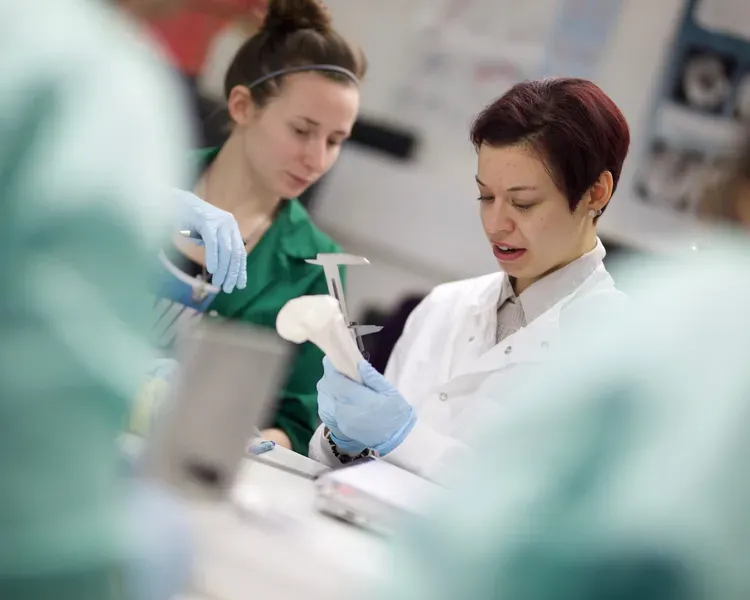Forensic Sciences
Information on the research and impact of the forensic sciences at the University of Dundee.

The School hosts the largest interdisciplinary forensic science research team in the UK, which includes staff from the Leverhulme Research Centre for Forensic Science (LRCFS) and the Centre for Anatomy and Human Identification (CAHID).
Cluster members have background in the natural sciences, social sciences and humanities as well as a strong resonance with operational practice. This multidisciplinary team collaborates across the University community and beyond, creating multiple strands of research undertaken in collaboration with operational forensic practitioners.
The cluster have developed acknowledged leadership in forensic science through strategic partnerships locally, nationally and internationally, particularly with the judiciary, bringing science and law together to shape future research collaboratively.
Through path-finding strategic conversations, we have developed comprehensive research road maps in collaboration with forensic scientists, crimes scene examiners, law enforcement and legal practitioners.
Research work is contextualised by these collaborative research roadmaps and based across five pillars of activity; current projects associated with these include:
Detection
Identification and characterisation of novel psychoactive substances; development of novel nanobiosensors for explosives, drugs and body fluids, and the development of methods for facial reconstruction.
Recognition
Development of ground truth datasets in new psychoactive substances and ignitable liquids, hand biometrics, data sets for skeletal characterisation, and data sets relating to the transfer and persistence of materials, including citizen science innovations to create data at scale.
Comparison
Understanding measurement uncertainty, the use of machine learning and AI for pattern recognition in forensic datasets, age estimation in the living.
Interpretation and evaluation: probabilistic reasoning for activity level case-based scenarios; development of algorithms for interpretation of DNA samples; using virtual reality applied to crime scene investigation.
Communication
Understanding and improving science communication across the forensic science communities, researching the use of comics and public engagement in enabling citizens to understand and contextualise forensic evidence.
Impact
Two impact case studies submitted to REF2021 originate from this cluster: one relates to the identification and characterisation of controlled substances in collaboration with a range of forensic science partners, but specifically the Scottish Prison Service, providing early warning information to the United Nations and World Health Organisation; the second relates to the professional development of fire investigation leading to the production of two major Codes of Practice that have been adopted and endorsed by professional bodies across the UK and Europe.
The forensic science practitioners in the team undertake approximately 150 cases per year, some of which lead to involvement in major criminal and public inquiries. In addition, the team analyses in excess of 1000 suspected new psychoactive substances per year directly impacting on health, safety and wellbeing of prison staff and inmates as well as the development of policy and practice within the Scottish Prison Service and wider community in combating drug deaths across Scotland.
Forensic science at Dundee has developed a bespoke public-engagement and science-communication strategy generating thousands of face-to-face interactions and reaching audiences in the millions via broadcast media, including a TV crime series showcasing the city, inspired by our activities in forensic chemistry and forensic anthropology. We work with local and National communities through the National Academies, Science Centres, schools and libraries. We provide engagement and impact through the development of award-winning games, comics, interactive theatre and a unique podcast series – Inside Forensic Science.
Contribution to the strategic themes
Enhancing Human Health and Wellbeing
- combating drug deaths through operational engagement and capability building of front-line public services and forensic practitioners through real time drug testing
- characterisation of existing and emerging drug compounds, feeding into national and international early warning systems and policy development
- understanding the metabolism of polydrug and developing AI-based tools for prediction of evolving drug threats
Empowering Society through Science and Technology
- development of the use of Virtual Reality in crime scene investigation and training
- development of novel chemical and biological techniques and sensors for forensic science applications
- developing multiple ground truth data sets for characterisation and transfer/persistence and background abundance of materials
- using machine learning and AI in the comparison of forensic evidence, including digital evidence, to support its interpretation and evaluation within a case context
- exploring new technologies to understand decision making
- exploring the interfaces between law and the implementation of new technologies and developing public engagement and understanding of forensic science procedures and practice in the justice systems
- enabling accessibility to fair justice through understanding and developing innovative science communication tools for practitioners and the public
Research cluster lead
Membership
- Agnieszka Kuffel
- Alexander Gray
- Angela Daly
- Anne Coxon
- Catriona Davies
- Clara Morris
- Craig Cunningham
- Diana Swales
- Farhan Santo
- Heather Doran
- Helen Langstaff
- Herve Menard
- Hilary Arsenault
- Joyce Klu
- Julieta Gomez Garcia-Donas
- Lorna Nisbet
- Lucina Hackman
- Roberto Puch-Solis
- Muthu Rama Mookiah
- Niamh Nic Daeid
- Oluwaswesan Adegoke
- Tobias Houlton
- Victoria Marland
- Vincenzo Rinaldi
- Virginie Galais